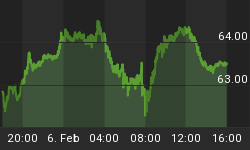An old trading adage states the following: markets can remain irrational longer than investors can remain solvent. As our recent experience with the dot com bubble proved, in financial markets anything is possible in the short-run. It never ceases to amaze me that despite the fact that so many of us have seen this movie before, so few of us remember how it ends.
During the latter 1990s "investors" purchased shares of internet companies despite the fact that those companies were losing money. Today, "investors" are buying shares of America.com (U.S. dollars,) despite the fact that it too is bleeding red ink, as evidenced by today's release of September's record 66.1 billion dollar trade deficit. If annualized, this monstrosity will produce close to an $800 billion dollar loss for America.com.
One of the most interesting aspects of this year's dollar rally is the market environment in which it is occurring. During the last significant dollar bull market, which took place between 1995 and 2000, U.S. financial assets also rose in value (though bond prices declined from 1998-2000 as the Fed began raising interest rates,) while gold and commodity prices fell. However, thus far in 2005, U.S. financial assets have languished, while gold is up over 6%, the CRB index is up 12%, and oil prices are up 40%.
In the 1990s, demand for dollars reflected the increased global popularity of U.S. financial assets. Foreigners bought dollars to facilitate investments in U.S. stocks and bonds, and gold and other commodity prices fell as a result of wide-spread complacency. Though such optimism was certainly misplaced, it nevertheless represented legitimate investor demand.
In sharp contrast, this year's relatively poor performance of U.S. financial assets and strength in gold suggests that such confidence is no longer present. Current dollar demand is coming from short-term currency speculators, central banks, and leveraged carry traders, and will likely reverse as soon as the trends change or rate differentials narrow. The near 50% decline in foreign bidding at yesterday's U.S. Treasury auction of five-year notes, followed by today's record foreign central bank participation (indirect bidders bought 55.6% of the supply) in the ten-year auction, evidences this fact perfectly.
In the mean time, do not confuse the dollar's current strength with the start of a new bull market. Nor should you take it as proof that America's current account, trade and budget deficits, and its lack of domestic savings and production, do not matter after all. Buying the dollar.com today makes as much sense as did buying dot com stocks during the tech bubble, and those repeating the mistakes of the past are likely to experience similar results.
For those who have learned the lessons of history, the current dollar rally is a gift-horse. Do not miss the opportunity to sell your dollars.com to those foolish enough to buy them. Download my free research report "The Collapsing Dollar: The Powerful Case for Investing in Foreign Equities," available at www.researchreport1.com, and sell before the buyers come to their senses.















